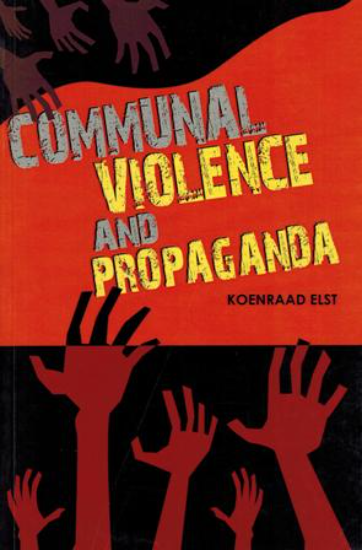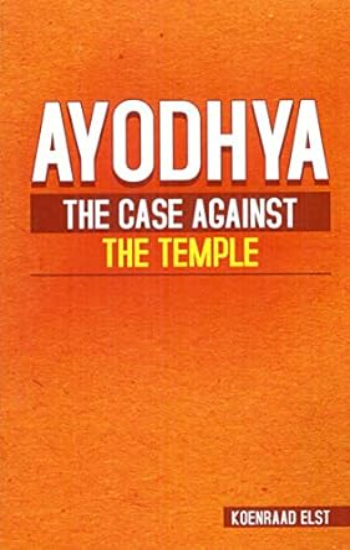
Save: 5%

Save: 10%
Ayodhya: the case against the temple
Publisher:
| Author:
| Language:
| Format:
₹395 ₹375
Save: 5%
In stock
Ships within:
In stock
ISBN:
Page Extent:
The present book is my last contribution to the literature on what is known in India as communalism, meaning the conflict between the different religions, principally Hinduism and Islam. My first book in this sphere of interest was Ram Janmabhoomi vs. Babri Masjid: A Case Study in Hindu-Muslim Conflict (1990). It served a good purpose, viz. to break the false impression that the world of scholarship including Western Indologists was united in certifying that the Hindu claim to the disputed site in Ayodhya was historically unfounded. In the subsequent years, evidence has been piling up in favour of the Hindu claim. Corning full circle, I have included in this book a compilation of papers on various aspects of the Ayodhya debate written by me between 1995 and 2002. Its main focus is the argumentation and view of Hindu-Muslim history offered by the anti-temple party. In references to the question whether there really was a Hindu temple at the Ayodhya site later covered by the Babri Masjid, the focus is invariably on the case made by the Hindu side, viz. that there was a temple, and that different types of evidence confirm this. The standard question is: is this evidence for the temple demolition scenario valid? Have they succeeded in proving the existence of the temple? By contrast, the opponents of the temple hypothesis are but very rarely asked to put their evidence on the table. The non-temple argumentation is confined to two types of evidence: arguments from silence, and attempts to find fault with pieces of evidence offered by the temple party. Criticism of the pro-temple argument is usually directed against a straw man, not against the actual argumentation as presented by pro-temple scholars. A number of much-acclaimed anti-temple publications bravely announce in the introduction or on the cover that they will demolish every argument given (or concocted and maliciously propagated) by the temple party, but then fail to address or even mention the main statements of the pro-temple party. The most powerful nonofficial books by pro-temple scholars are simply never mentioned, let alone discussed. Even the official argumentation offered by the scholars mandated by the Vishva Hindu Parishad during the Government-sponsored debate is generally ignored. Future historians will include the no-temple argument of the 1990s as a remarkable case study in their surveys of academic fraud and politicized scholarship. With academic, institutional and media power, a new academic-journalistic consensus has been manufactured denying the well-established history of temple demolition by Islamic iconoclasm to the Babri Masjid Ram Janmabhoomi site; at least among people with prestige and influence but no first-hand knowledge of the issue. But the facts will remain the facts, and their ongoing suppression is bound to give way as new generations of scholars take a fresh look at the data.;
The present book is my last contribution to the literature on what is known in India as communalism, meaning the conflict between the different religions, principally Hinduism and Islam. My first book in this sphere of interest was Ram Janmabhoomi vs. Babri Masjid: A Case Study in Hindu-Muslim Conflict (1990). It served a good purpose, viz. to break the false impression that the world of scholarship including Western Indologists was united in certifying that the Hindu claim to the disputed site in Ayodhya was historically unfounded. In the subsequent years, evidence has been piling up in favour of the Hindu claim. Corning full circle, I have included in this book a compilation of papers on various aspects of the Ayodhya debate written by me between 1995 and 2002. Its main focus is the argumentation and view of Hindu-Muslim history offered by the anti-temple party. In references to the question whether there really was a Hindu temple at the Ayodhya site later covered by the Babri Masjid, the focus is invariably on the case made by the Hindu side, viz. that there was a temple, and that different types of evidence confirm this. The standard question is: is this evidence for the temple demolition scenario valid? Have they succeeded in proving the existence of the temple? By contrast, the opponents of the temple hypothesis are but very rarely asked to put their evidence on the table. The non-temple argumentation is confined to two types of evidence: arguments from silence, and attempts to find fault with pieces of evidence offered by the temple party. Criticism of the pro-temple argument is usually directed against a straw man, not against the actual argumentation as presented by pro-temple scholars. A number of much-acclaimed anti-temple publications bravely announce in the introduction or on the cover that they will demolish every argument given (or concocted and maliciously propagated) by the temple party, but then fail to address or even mention the main statements of the pro-temple party. The most powerful nonofficial books by pro-temple scholars are simply never mentioned, let alone discussed. Even the official argumentation offered by the scholars mandated by the Vishva Hindu Parishad during the Government-sponsored debate is generally ignored. Future historians will include the no-temple argument of the 1990s as a remarkable case study in their surveys of academic fraud and politicized scholarship. With academic, institutional and media power, a new academic-journalistic consensus has been manufactured denying the well-established history of temple demolition by Islamic iconoclasm to the Babri Masjid Ram Janmabhoomi site; at least among people with prestige and influence but no first-hand knowledge of the issue. But the facts will remain the facts, and their ongoing suppression is bound to give way as new generations of scholars take a fresh look at the data.;
About Author
Reviews
Clear filtersThere are no reviews yet.
YOU MAY ALSO LIKE…
Guru to the World : The Life and Legacy of Vivekananda
Save: 20%
Indian Railway Buildings: Heritage, History & Beyond
Save: 25%
REBEL SULTANS : The Deccan from Khilji to Shivaji
Save: 15%
Reflections On The History Of Indian Science And Technology
Save: 25%
Watershed 1967: India's Forgotten Victory over China
Save: 15%




Reviews
Clear filtersThere are no reviews yet.